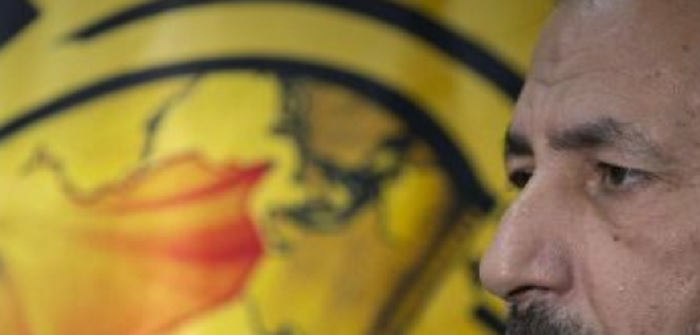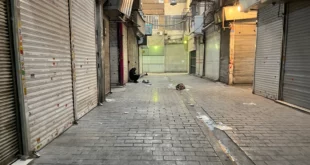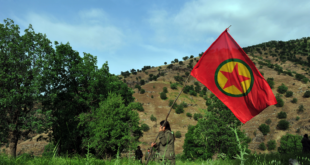
The Kadhimi government denies reaching a conditional truce with the pro-Iranian militia.
The Iraqi government has denied that it negotiated with Iran-affiliated militias to try and reach a conditional truce to stop the US Embassy in Baghdad from being shelled by Katyusha rockets.
The denial came hours after Iraqi militia Kata’ib Hezbollah announced that Iranian-backed armed factions had agreed to suspend their missile attacks on US forces in Iraq on the condition that the Iraqi government provide a timetable for the withdrawal of these forces from the country.
A source from the office of Iraqi Prime Minister Mustafa al-Kadhimi denied during an interview with The Arab Weekly’s correspondent in Baghdad that the government had negotiated with any armed faction to stop the attacks on the US Embassy in Baghdad.
“The government did not reach a conditional truce with any armed faction to stop targeting the US embassy,” the source said, noting that “Kataib’s announcement came after the Iraqi army began a redeployment operation in many areas inside the Iraqi capital to pursue those launching Katyusha rocket at Baghdad airport and the American embassy.”
“The government is not aware of any negotiations between the factions and any other party regarding stopping the missile attacks on the US embassy,” he added.
For his part, Mohammed Mohi, spokesman for Kata’ib Hezbollah, said, “The factions gave a conditional truce, and this conditional truce is directed at the Iraqi government in particular, because it is the one concerned with implementing the decision of the House of Representatives.”
He added that the agreement “basically includes all factions, (including) the factions that may also target US forces,” pointing out that the Iraqi government must enforce a decision made in parliament last January to call for the withdrawal of all foreign forces from Iraq.
Iraq’s parliament issued the decision following the American drone strike at Baghdad airport that killed Iranian military commander Qassem Soleimani and the leader of militant Shia factions in Iraq, Abu Mahdi al-Muhandis, which at the time raised fears of a general Iranian-American confrontation on Iraqi soil.
Mohi said there was no specific deadline by which the government had to implement the decision, but warned that if the Americans did not respect the Iraqi parliament’s decision, factions affiliated with Iran would use “all the weapons available to them,” noting that the Katyusha rockets launched at the American forces and diplomatic compounds “were messages addressed to the Americans.” More severe attacks may occur later, he warned.
Political sources in Baghdad believe that the announcement by pro-Iranian militias that they are halting attacks on the US embassy may just be a response to the stern threats expressed by the United States, which has grown exasperated with the assaults on its mission.
The same sources pointed out that the United States was about to close its embassy in Baghdad due to the nearly daily missile attacks, noting that US officials recently expressed to their Iraqi counterparts that shutting the US embassy in Baghdad could represent a heavy blow to Iraq.
The US embassy closure could result in Washington suspending support to Iraq, especially in the military and economic fields, or targeting pro-Iranian militia leaders in Iraq.
Observers say that pro-Iranian militia leaders may have sensed the danger of the deteriorating situation in Iraq, which put them at risk of being taken out by the Americans like Soleimani and Muhandis. This, they say, prompted them to announce the suspension of hostilities against the US Embassy in Baghdad.
Kata’ib Hezbollah is the largest Iraqi armed group affiliated with Iran, and its announcement that it is halting missile attacks on the US embassy shows it is taking responsibility for the hostilities at US interests in the country, after months of procrastination and media manoeuvres to avoid it.
Observers say that Kata’ib Hezbollah and other known large militias in Iraq have tried to hide behind aliases and names of fictitious militias, to which they attributed attacks against American interests in Iraq, but now that America’s anger is at its peak, they decided to implicitly acknowledge their responsibility for these hostilities.
Such a declaration by the militias represents a big blow to the image of invincibility they were trying to cultivate among the Iraqi public.
 Eurasia Press & News
Eurasia Press & News



